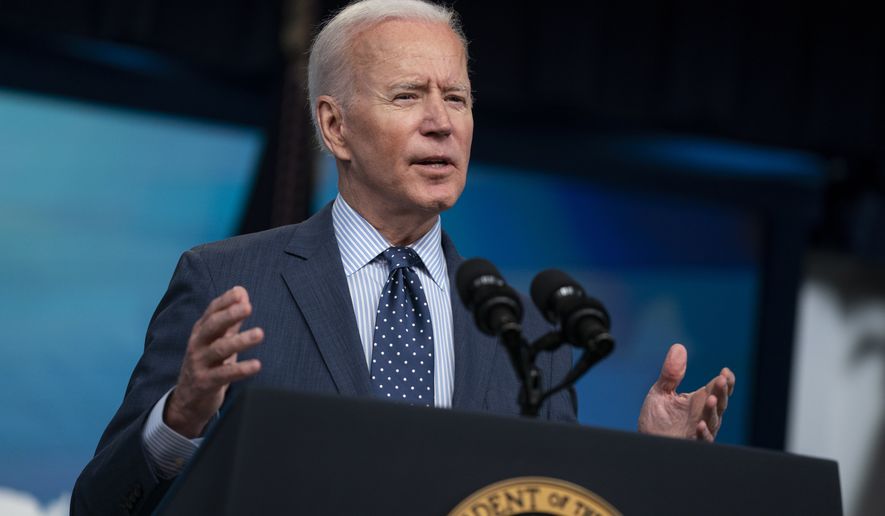President Biden abandoned bipartisan infrastructure talks with Senate Republicans on Tuesday over the party’s unwillingness to compromise on raising taxes.
The White House said Mr. Biden decided to jettison talks because Republicans were not ready to “meet the essential needs of our country to restore our roads and bridges, prepare us for our clean energy future, and create jobs.”
Republicans blamed the president for not backing off on his plan to raise taxes.
“I spoke with the president this afternoon, and he ended our infrastructure negotiations,” said Republican Sen. Shelley Moore Capito of West Virginia, who had led the GOP’s talks with the White House. “Despite the progress we made in our negotiations, the president continued to respond with offers that included tax increases as his pay-for, instead of several practical options that would have not been harmful to individuals, families and small businesses.”
The announcement came shortly after congressional leaders on both sides of the aisle signaled the talks had stalled. Senate Majority Leader Charles E. Schumer, New York Democrat, summed up the talks as having run “into a brick wall.”
Mr. Biden initially proposed spending about $2.25 trillion on infrastructure, with most of the money earmarked for social welfare and combating climate change. Republicans balked at the sum, arguing that any infrastructure package should focus exclusively on repairing the nation’s roads and bridges.
Both sides had since compromised to an extent. Republicans upped their initial price ceiling, offering to spend close to $1 trillion. The White House similarly conceded ground, trimming its proposed spending from $2.25 trillion to $1.7 trillion.
Neither side, however, was able to compromise on how to pay for the new spending. Mr. Biden proposed to raise taxes by instituting a 15% minimum corporate tax or undoing much of the 2017 Trump tax cuts. Republicans, meanwhile, stood firm that tax hikes were a “red line” for the negotiations.
Mr. Biden “has never really moved toward us, in terms of infrastructure, he had lots of broad requests for things that the American people don’t see as infrastructure, and he’s never backed away from his desire to continue to want to raise taxes,” said Sen. John Barrasso of Wyoming, one of the GOP negotiators.
With talks between Ms. Capito and the White House officially concluded, momentum is quickly shifting toward another bipartisan group of senators. That group, which is not tied to the Senate leadership of either party, is looking to put together a coalition from the center.
Among its members are centrist Democrats, such as Sens. Joe Manchin III of West Virginia and Kyrsten Sinema of Arizona, along with centrist Republicans, specifically Sens. Rob Portman of Ohio and Mitt Romney of Utah.
Mr. Romney said his group would be working off the progress made by Ms. Capito and the GOP leadership.
“So we began working weeks ago and we’ve got Republicans and Democrats that agree, pretty much down to dollars and cents,” Mr. Romney said. “Both what we’re going to spend the money for and how it’s going to be paid for.”
The group, which has not rolled out its proposal, is expected to focus on core infrastructure programs, such as transportations systems, at the expense of social spending.
“If you look at the items that we agree should be part of an infrastructure bill, and compare that with the White House, our numbers are pretty close,” Mr. Romney said. “So, you take [the social welfare spending] aside and say let’s just look at physical infrastructure.”
Mr. Romney further argued that a deal that does not raise taxes is possible, suggesting that Mr. Biden’s push on the issue lacked political will.
“I think the White House is inclined to do that, but I don’t think people in the Senate find that to be an unattractive alternative,” the Utah Republican said.
It is unclear if Mr. Romney’s group will have any more success than Ms. Capito’s group.
Regardless, Mr. Schumer and Democrats are not waiting to see how the next round of talks go. The majority leader is already preparing to move an infrastructure package through the budget reconciliation process, which allows spending bills to pass the Senate with a simple majority of 51 votes.
“We’re pursuing a two-path proposal,” Mr. Schumer said. “On the one hand there are bipartisan negotiations … that’s good, but that’s not going to be the only answer. We all know as a caucus we will not be able to do all the things that the country needs in a bipartisan way.”
• Haris Alic can be reached at halic@washingtontimes.com.




Please read our comment policy before commenting.